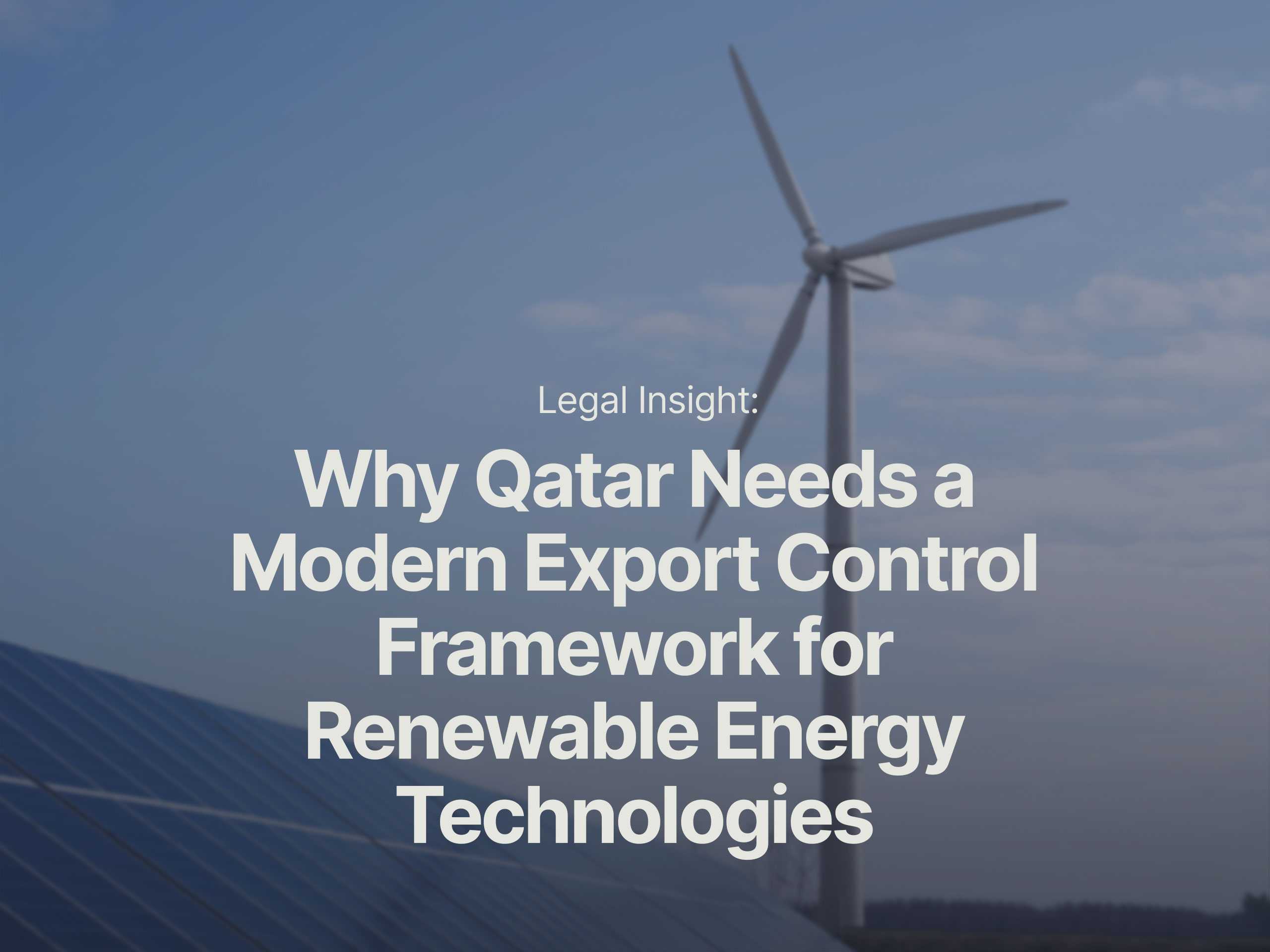As Qatar takes bold steps toward diversifying its economy and embracing energy transition goals, investments in solar power, green hydrogen, and smart grid technologies are rapidly gaining momentum. However, one critical element remains underdeveloped, which is, a comprehensive modern export control framework legal for controlling the export and import of renewable energy technologies.
The Growing Risk Landscape
Most of Qatar’s clean energy infrastructure including solar panels, electrolyzers, smart meters, and energy storage components is imported from technologically advanced nations such as Japan. These jurisdictions maintain strict export control laws, often requiring:
End-user and end-use certification
This certification ensures that imported technologies are used strictly for their intended, peaceful, and environmentally sound purposes. Without it, there’s a heightened risk of unauthorized re-exports or misuse, which could expose Qatar to sanctions or supplier blacklisting. Establishing domestic mechanisms to verify and audit end-users can foster trust with exporting nations and streamline future technology partnership.
Environmental and ethical assurances
Exporting nations often require proof that imported technologies will not be used in a manner that violates environmental treaties or human rights. For Qatar, aligning with these standards enhances its global sustainability profile and reduces scrutiny in trade negotiations. It also ensures compatibility with ESG benchmarks increasingly demanded by international financiers and institutional investors.
Cybersecurity and data protection compliance
Modern renewable energy systems rely heavily on digital platforms that collect, store, and transmit sensitive operational data. Without cybersecurity controls, imported technologies could serve as backdoors for cyberattacks or industrial espionage. A legal framework tailored to energy-specific data protection helps mitigate these risks and builds confidence among foreign technology vendors.
While these controls are designed to safeguard sensitive technologies and national interests, they also place obligations on importing countries like Qatar. Without matching legal standards or enforcement systems, Qatar risks:
Delays in procurement due to non-compliance
If Qatar cannot demonstrate conformity with the export regulations of partner countries, shipments can be delayed or cancelled altogether. These delays disrupt project timelines and can significantly increase operational costs. A predictable, well-regulated trade environment ensures smoother customs clearance and fewer interruptions in the energy infrastructure rollout.
Loss of investor trust and technology partnerships
Investors and technology suppliers prioritize jurisdictions with clear, stable, and enforceable trade laws. The absence of such frameworks in Qatar may be interpreted as a governance risk, deterring long-term capital and innovation inflows. Creating a transparent export control system signals Qatar’s commitment to rule-based commerce and global energy cooperation
Ineligibility for certain green financing schemes
Many green funds, particularly those governed by Organisation for Economic Co-operation and Development (OECD) guides or European Union (EU) standards, require recipient countries to meet specific legal and ethical thresholds. Without a modern export control regime, Qatar may struggle to qualify for concessional loans, climate bonds, or technical assistance. Aligning domestic policy with international norms opens doors to strategic funding critical for accelerating the energy transition.
Furthermore, as Qatar develops indigenous green technologies, the lack of domestic export control laws focused primarily on renewable technologies may limit market access and expose it to cross-border legal disputes.
Key Legal Gaps Highlighting the Need for a Modern Export Control Framework
On the subject of renewable technology exports, some crucial legal loopholes need to be closed such as:
Lack of End-User Verification for Imports
Critical smart energy systems such as AI-driven grid management software and remote sensors often contain sensitive data points and control features. The absence of end-use oversight opens the door to misuse or compromise.
Overdependence on Foreign Export Rules
Relying on the frameworks of exporting nations without enacting parallel Qatari laws weakens national sovereignty and reduces Qatar’s bargaining power in international technology agreements.
Strategic Legal Solutions to promote the Establishment of a Modern Export Control Framework
To overcome the regulatory concerns and close legal gaps, the following legal solutions can be put in place:
Enact a Renewable Energy Technology Trade and Export Law
A bespoke legal framework tailored to the trade of green technologies will offer much-needed clarity. It should define permissible technologies, licensing procedures, and industry-specific compliance protocols.
Establish a Central Export Control Office
A designated regulatory body under the Ministry of Energy or Ministry of Commerce and Industry (MOCI) can act as a single-window clearance system, improving speed, efficiency, and interagency coordination.
Embed ESG and Cybersecurity Requirements into Trade Policy
Trade governance should require compliance with ESG indicators and international data protection standards. This strengthens Qatar’s standing as a responsible and secure trade partner.
Facilitate Stakeholder Engagement and Regulatory Co-Creation
Engaging energy firms, legal experts, and tech developers ensures the regulatory framework is practical, inclusive, and forward-looking.
Conclusion
Qatar has made remarkable strides in building a cleaner energy future. But to become a global leader in green energy trade, legal infrastructure must evolve in tandem. By addressing legal vulnerabilities today, Qatar can solidify its reputation as a secure, innovative, and trusted energy partner on the world stage.
